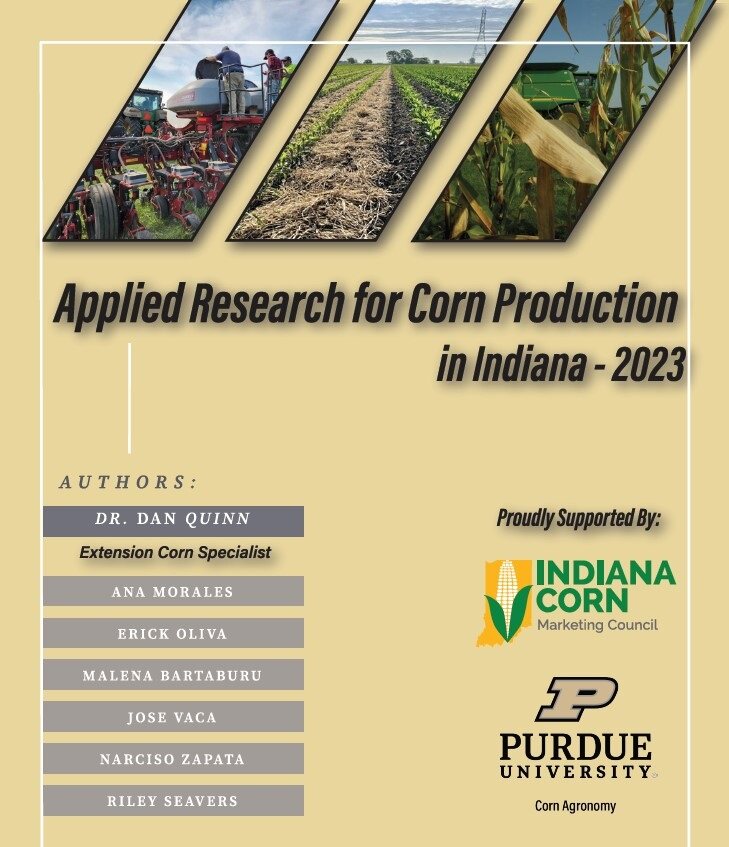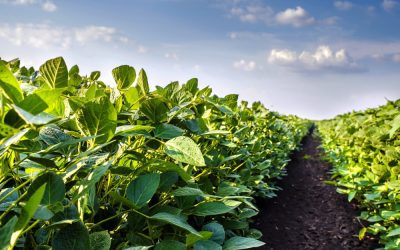Corn Research Book provides valuable data to help farmers improve practices
By Anita Sharkey

Dan Quinn, Assistant Professor of Agronomy and Extension Corn Specialist at Purdue University, is thoroughly informed on the research conducted on corn production across Indiana. This research is compiled annually into The Applied Research for Corn Production or, as he refers to it, the Corn Research Book.
The book provides valuable data and findings to aid farmers in improving their practices and yields. In the book, Quinn covers the various trials conducted, the collaboration with the Indiana Corn Marketing Council (ICMC) and the importance of farmer-driven research.
The Applied Research for Corn Production includes results from on-farm research trials conducted under the direction of Quinn in 2023. He highlighted the diversity of these trials, stating that they encompass a wide range of topics relevant to corn production. The primary goal of this project is to make university research accessible to Indiana farmers who can benefit directly from the insights and data.
“We do upwards of 40-50 research trials around the entire state of Indiana yearly,” he said. “This book is a condensed version of various studies, sharing yield results, economic results, soil test results and more. It’s about giving farmers a chance to see if there’s something they can try on their own farms.”
Quinn emphasized two significant studies: the Intensive Management Trial and the Biologicals Study.
Intensive Management Trial
Funded by ICMC for two years, this expansive study examined various management practices and products across multiple locations, even collaborating with three other states.
“This study has a lot of good information from both a production and economic standpoint,” Quinn noted. “It includes seeding rates, fungicides, micronutrients, sulfur and more, allowing farmers to look at a variety of practices.”
An ICMC-supported trial examines corn yield response to different management practices and inputs. R1 foliar fungicide application, increased seeding rate and intensive treatment led to increased corn grain yield. Another result from the trial showed that foliar disease presence like tar spot and gray leaf spot was reduced by R1 fungicide application, likely driving the observed yield response.
Biologicals Study
This study focuses on nitrogen-fixing biologicals and examines their impact on production and the environment. “We’ve drastically expanded this research over the last couple of years. We had six locations this year, both field scale and small plots,” Quinn explained. “It’s a very expansive study that will continue over multiple years.”
Early results showed that corn yield wasn’t improved by biological products at the examined nitrogen fertilizer rates. Analysis of additional locations is still ongoing this year.
The ‘Why’ behind the research
Quinn emphasized the importance of conducting research driven by farmer’s needs and questions.
“My research program is very applied, addressing direct questions from the environment or farms,” he said. “A lot of my research ideas come from farmers. We aim to take a question from a farmer and conduct research to provide answers quickly.”
This approach is precious because it allows for unbiased, comprehensive research unrelated to any specific company or product. “We’re in a unique position to test various things and share the results,” Quinn added. “This unbiased research helps farmers learn and make informed decisions.”
Unbiased research will ultimately lead to better education and advocacy for Indiana farmers. The primary goal is to equip farmers with the resources and knowledge to achieve the highest possible yields.
Collaboration with the corn checkoff
ICMC has supported and collaborated with Quinn’s research program throughout his time at Purdue. Beyond these research initiatives, ICMC also supports other endeavors that contribute to the agricultural community.
One such initiative is the Purdue Crop Chat podcast, a platform that provides farmers with timely information and insights on crop management, emerging technologies and industry trends. The podcast is part of Hoosier Ag Today’s podcast network.
Additionally, ICMC is a key sponsor of the Corn Improvement Conference, an event that brings together experts, researchers, and farmers to discuss advancements in corn production and share valuable knowledge.
“Indiana Corn is a great supporter of applied research and the dissemination of results,” Quinn said. “Their support helps drive a lot of what we do and ensures that the research benefits the farmers.”
Purdue also invites farmers to attend field days for an opportunity to ask questions about research. Upcoming field days are scheduled for:
- Aug. 21 – Pinney Purdue Agricultural Center. For details, call 219-733-2379 or email sboyer@purdue.edu
- Aug. 22 – Northeast Purdue Agricultural Center. For details, call 260-244-7290 or email cclake@purdue.edu
- Aug. 27 – Southeast Purdue Agricultural Center. For details, call 812-458-6977 or email jwahlman@purdue.edu
- Aug. 29 – Davis Purdue Agricultural Center. For details, call 765-468-7022 or email jboyer@purdue.edu
Accessing the Corn Research Book
Taking everything into account, Dan Quinn’s research at Purdue University offers vital insights for Indiana corn farmers. The annual Corn Research Book, supported by ICMC, delivers practical data to boost yields.
For those interested in accessing Applied Research for Corn Production in Indiana, it is available here or on Quinn’s website, thekernel.info. Physical copies are distributed at Purdue’s field days and can be requested via email at djquinn@purdue.edu.
Posted: July 20, 2024
Category: ICMC, Indiana Corn and Soybean Post - July 2024, News




